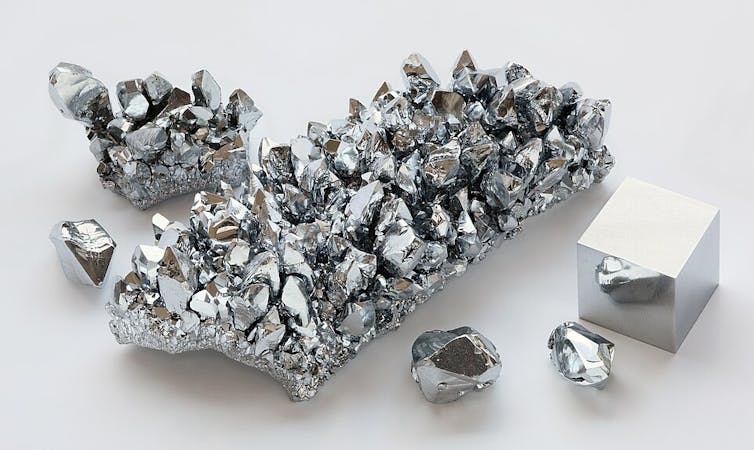You might best know chromium as a bright, shiny metal used in bathroom and kitchen fittings. But is it also essential for your health?
Author
- Neil Marsh
Professor of Chemistry and Biological Chemistry, University of Michigan
In a form known as trivalent chromium , this metal is included in multivitamin pills and sold as a dietary supplement that companies claim can improve athletic performance and help regulate blood sugar.
I'm a biochemistry professor with a long-standing interest in how metals function in biology. Although health agencies in the United States and other countries recommend chromium as a dietary requirement, eight decades of research have resulted in slim evidence that people derive any significant health benefits from this mineral.
Why, then, did chromium come to be considered essential for human health?
What is an essential trace element?
To stay healthy, people need what are called essential trace elements in their diet. These include metals such as iron, zinc , manganese, cobalt and copper. As the word "trace" implies, you need only tiny amounts of these metals for optimal function.
For most of these trace elements, decades of research have shown they are genuinely essential for health. Iron, for example, is essential for carrying oxygen in your blood , and many proteins - complex molecules that carry out all of the functions necessary for life - require iron to function properly. A deficiency of iron leads to anemia, a condition that results in fatigue, weakness, headaches and brittle nails, among other symptoms. Iron supplements can help reverse these symptoms.
Importantly, biochemists have pinpointed exactly how iron helps proteins perform essential chemical reactions, not just for humans but all living organisms. Researchers know not only that iron is essential but also why it is essential.
Little evidence for chromium's benefits
However, the same cannot be said for chromium.
Chromium deficiency - having little to no chromium in your body - is extremely rare , and researchers have not identified any clearly defined disease caused by low chromium levels.
Like all food, essential metals must be absorbed by your digestive system. However, the gut absorbs only about 1% of ingested chromium . Other essential metals are absorbed more efficiently - for example, the average person absorbs around 25% of certain forms of ingested iron .
Importantly, despite many studies, scientists have yet to find any protein that requires chromium to carry out its biological function. In fact, only one protein is known to bind chromium , and this protein most likely helps your kidneys remove chromium from your blood. While some studies in people suggest chromium might be involved to some degree in regulating blood glucose levels, research on whether adding extra chromium to your body through supplements can substantially improve your body's ability to break down and use sugar has been inconclusive .
Thus, based on biochemistry, there is currently no evidence that humans, or other animals, actually require chromium for any particular function.
Flawed research in rats
So how did chromium come to be considered an essential trace metal?
The idea that chromium might be essential for health stems from studies in the 1950s, a time when nutritionists knew very little about what trace metals are required to maintain good health.
One influential study involved feeding lab rats a diet that induced symptoms of Type 2 diabetes. Supplementing their diet with chromium seemed to cure the rats of Type 2 diabetes, and medical researchers were enticed by the suggestion that chromium might provide a treatment for this disease. Today's widespread claims that chromium is important for regulating blood sugar can be traced to these experiments.

Unfortunately, these early experiments were very flawed by today's standards. They lacked the statistical analyses needed to show that their results were not due to random chance. Furthermore, they lacked important controls, including measuring how much chromium was in the rats' diet to start with.
Later studies that were more rigorously designed provided ambiguous results . While some found that rats fed chromium supplements controlled their blood sugar slightly better than rats raised on a chromium-free diet, others found no significant differences. But what was clear was that rats raised on diets that excluded chromium were perfectly healthy.
Experiments on people are much harder to control for than experiments on rats, and there are few well-designed clinical trials investigating the effects of chromium on patients with diabetes. Just as with the rat studies, the results are ambiguous. If there is an effect, it is very small.
Recommendations based on averages
Why, then, is there a recommended dietary intake for chromium despite its lack of documented health benefits?
The idea that chromium is needed for health persists due in large part to a 2001 report from the National Institute of Medicine's Panel on Micronutrients. This panel of distinguished nutritional researchers and clinicians was formed to evaluate available research on human nutrition and set "adequate intake" levels of vitamins and minerals. Their recommendations form the basis of the recommended daily intake labels found on food and vitamin packaging and the National Institutes of Health guidelines for clinicians .
Despite acknowledging the lack of research demonstrating clear-cut health benefits for chromium, the panel still recommended adults get about 30 micrograms per day of chromium in their diet. This recommendation was not based on science but rather on previous estimates of how much chromium adult Americans already ingest each day. Notably, much of this chromium is leached from stainless steel cookware and food processing equipment , rather than coming from our food.
So, while there may not be confirmed health risks from taking chromium supplements, there's probably no benefit either.
![]()
Neil Marsh receives funding from the NIH and NSF.






